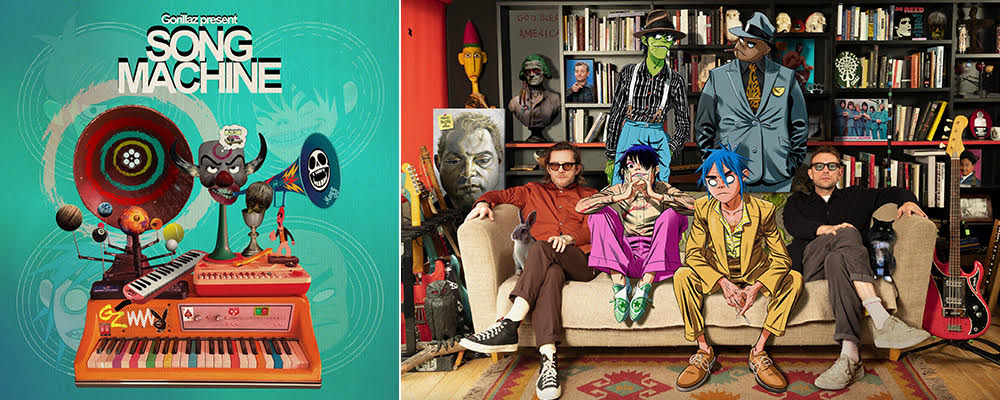‘Song Machine, Season One’: Gorillaz’ Latest Album Offers a Satisfying Tour Through Damon Albarn’s Influences
Todd Gilchrist
From the moment “Clint Eastwood” lumbered over pop music’s most distant horizon in 2001, Gorillaz have defied categorization, tested boundaries and transformed traditional notions of what a band can be. Damon Albarn and Jamie Hewlett’s virtual quartet of 2-D, Murdoc, Noodle and Russel have since become one of the industry’s most intriguing and reliable acts thanks to a revolving door of marquee collaborators who bring in wildly different influences, and lead into unpredictable, divergent directions while somehow making all of the group’s music sound uniquely cohesive.
Gorillaz’ seventh studio album, “Song Machine, Season One: Strange Timez,” is a continuation, and to some extent a culmination, of that exploratory instinct, the result of a web series where each episode is structured around a single and accompanied by a music video, and of course featuring one killer guest artist after another. A solid rebound after their stripped-down 2018 album “The Now Now,” which primarily felt like a showcase for Albarn, “Song Machine, Season One” boasts some of Gorillaz’ strongest work in years precisely because of the types of collaborations that have become a cornerstone of their identity.
In his post-Blur work, Albarn has become a musical equivalent of Quentin Tarantino, finding guest performers from all across the musical spectrum, some deeply established, some brand new, and others out of vogue but simply needing the right showcase. In the past, he’s worked with Bobby Womack and George Benson, Tina Weymouth and Lou Reed; this time, the album opener “Strange Timez” features the welcome return of The Cure’s Robert Smith on vocals, and later on “The Pink Phantom,” Elton John duets with rapper 6lack. Given his own idiosyncratic creativity, it’s almost shocking that Beck hadn’t recorded with the band before, but he trades verses with Albarn on “The Valley of the Pagans” in a glam-pop performance that exceeds expectations. Conversely, longtime Gorillaz producer Remi Kabaka Jr. updates the sound of New Wave luminary Peter Hook on “Aries,” a track that evokes the sound of Joy Division and New Order with a more contemporary synth-pop polish.
Although “Song Machine, Season One” is more broadly eclectic than the soul and hip-hop-focused “Humanz,” Albarn’s skill in selecting MCs remains undiminished, reteaming with Schoolboy Q for the chugging “Pac-Man” and enlisting iconic producer Prince Paul for vocals and some extra musical flourishes. Mike Will Made It’s production on “Dead Butterflies” epitomizes the goals of the Gorillaz project, merging these very disparate musical sensibilities, commercial instincts with true artistry, as his trap beats synthesize perfectly with Albarn’s musicality underneath British rapper Kano’s introspective lyrics. Similarly, the disc wraps with “How Far?” as rapper Skepta pirouettes around British rapper and frequent Albarn collaborator Tony Allen reinvents the idea of a hip-hop backbeat with his singular African drum patterns.
Featuring watery synths that recede underneath the juxtaposition of rapper Slowthai and punk duo Slaves, Gorillaz really indulge their most divergent ideas on tracks like “Momentary Bliss,” offering what emerges as a whole as a soundtrack for the uneven feelings of their listeners: reflective, sometimes angry, occasionally romantic, and others just wanting to party, Gorillaz have you covered. Atlanta hip-hop duo EarthGang take charge on “Opium,” an uptempo dance track that echoes Allen’s influence and Albarn’s longstanding curiosity with Afrobeat; if you want more of that vibe, “Severed Head” sounds like a lost great Burna Boy song, especially with rapper GoldLink quietly commanding the microphone over the spacey ambience of Unknown Mortal Orchestra’s musical accompaniment. In fact, this is very much the right record for a post “Black Is King” world. If Beyonce’s visual album didn’t reset the parameters of black music to demand a more global perspective, then it certainly alerted American ears to different unexplored aspects of the black musical diaspora, and Albarn seems keen to pick up that baton and run with it.
Of course, Albarn’s leadership in that particular cultural evolution needs to be further behind the scenes, or at least in the service of advocating for artists in greater need of a platform for their work — and that’s the purpose Gorillaz has always served. If everybody knows that it’s Albarn pulling the strings, he’s still the one who most frequently spotlights his collaborators and steps back into the shadows. The collaborations are not just king, they’re the record’s raison d’etre, and this latest work is not just an evolution of that ethos but a reminder that the combination and exploration of those different styles and skills is what gives the virtual group’s discography its depth and meaning. Ultimately, Gorillaz continue to be one of the most consistently challenging, fearless and dynamic bands working today, offering listeners more surprises not just from album to album, but now more than ever, from track to track; not only does “Song Machine, Season One: Strange Timez” exemplify that, but it speaks to the impact that they make — one that’s vivid and feels very real, even if technically they aren’t.
“Song Machine, Season One: Strange Timez” releases Oct. 23 on Apple Music.

